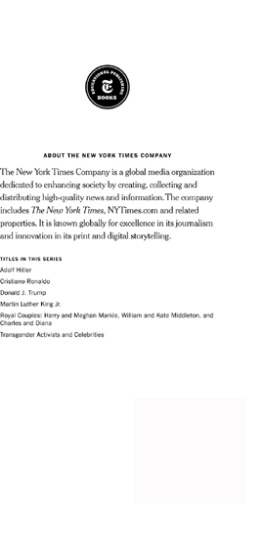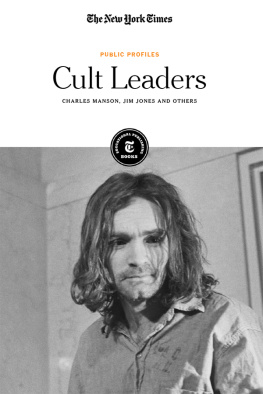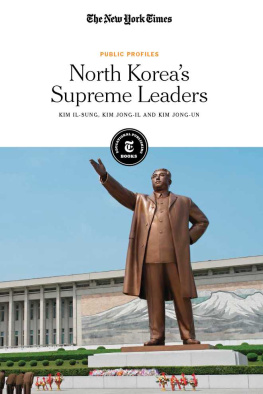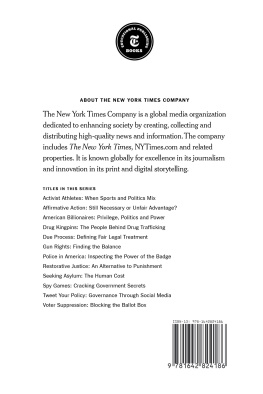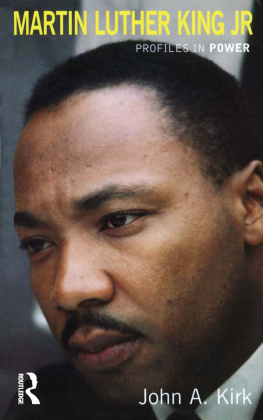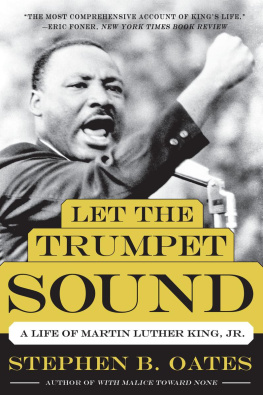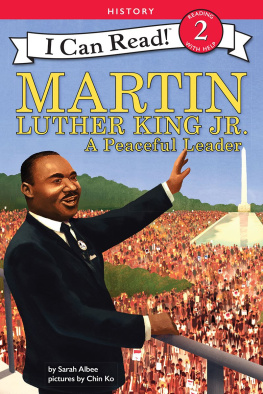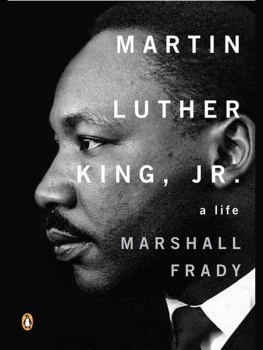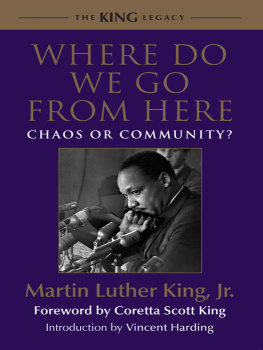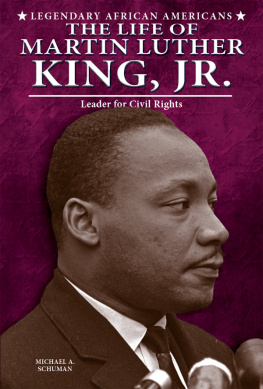Page List

Published in 2019 by New York Times Educational Publishing
in association with The Rosen Publishing Group, Inc.
29 East 21st Street, New York, NY 10010
Contains material from The New York Times and is reprinted
by permission. Copyright 2019 The New York Times. All rights reserved.
Rosen Publishing materials copyright 2019 The Rosen
Publishing Group, Inc. All rights reserved. Distributed exclusively by Rosen Publishing.
First Edition
The New York Times
Alex Ward: Editorial Director, Book Development
Brenda Hutchings: Senior Photo Editor/Art Buyer
Heidi Giovine: Administrative Manager
Phyllis Collazo: Photo Rights/Permissions Editor
Rosen Publishing
Greg Tucker: Creative Director
Brian Garvey: Art Director
Megan Kellerman: Managing Editor
Cataloging-in-Publication Data
Names: New York Times Company.
Title: Martin Luther King Jr. / edited by the New York Times editorial staff.
Description: New York : The New York Times Educational Publishing,
2019. | Series: Public profiles | Includes glossary and index.
Identifiers: ISBN 9781642820317 (pbk.) | ISBN 9781642820300 (library bound) | ISBN 9781642820294 (ebook)
Subjects: LCSH: King, Martin Luther, Jr., 19291968Juvenile
literature. | African AmericansCivil rightsHistory20th centuryJuvenile literature. | Civil rights workersUnited States
BiographyJuvenile literature.
Classification: LCC E185.97.K5 M378 2019 | DDC 323.092 Bdc23
Manufactured in the United States of America
On the cover: Dr. Martin Luther King Jr. addresses attendees gathered for the Prayer Pilgrimage for Freedom at the Lincoln Memorial in Washington, D.C., on May 17, 1957; George Tames/ The New York Times.
Contents
BY WAYNE PHILLIPS
BY THE NEW YORK TIMES
BY WAYNE PHILLIPS
BY STANLEY ROWLAND JR.
BY GEORGE BARRETT
BY GEORGE BARRETT
BY JAY WALZ
BY JOSEPH A. LOFTUS
BY THE NEW YORK TIMES
BY THE NEW YORK TIMES
BY CLAUDE SITTON
BY CLAUDE SITTON
BY THE NEW YORK TIMES
BY THE NEW YORK TIMES
BY CLAUDE SITTON
BY HEDRICK SMITH
BY CLAUDE SITTON
BY JAMES RESTON
BY GENE CURRIVAN
BY INTERNATIONAL HERALD TRIBUNE
BY JOHN HERBERS
BY INTERNATIONAL HERALD TRIBUNE
BY ROY REED
BY GENE ROBERTS
BY JOHN HERBERS
BY GLADWIN HILL
BY THE NEW YORK TIMES
BY THE NEW YORK TIMES
BY DOUGLAS ROBINSON
BY THE NEW YORK TIMES
BY THE NEW YORK TIMES
BY LAWRENCE E. DAVIES
BY GENE ROBERTS
BY DOUGLAS ROBINSON
BY DOUGLAS ROBINSON
BY PAUL HOFMANN
BY WALTER RUGABER
BY GENE ROBERTS
BY THE NEW YORK TIMES
BY GENE ROBERTS
BY WALTER RUGABER
BY THE NEW YORK TIMES
BY WALTER RUGABER
BY BEN A. FRANKLIN
BY BEN A. FRANKLIN
BY WALTER H. WAGGONER
BY WALTER RUGABER
BY EARL CALDWELL
BY EARL CALDWELL
BY DAVID MARGOLICK
BY LAWRENCE VAN GELDER
BY THE NEW YORK TIMES
BY THE NEW YORK TIMES
BY MURRAY SCHUMACH
BY WALTER RUGABER
BY HOMER BIGART
BY THE NEW YORK TIMES
BY JESSE JACKSON
MARTIN LUTHER KING JR. had a dream. With this dream, he persuaded a nation to believe in the possibility of peace, harmony and racial equality.
Rev. Dr. Martin Luther King Jr. was a civil rights activist during a time when Jim Crow laws in the deep South segregated blacks from whites, and civil rights were largely theoretical, existing on paper but not particularly in practice. Dr. King believed it was possible to change this and to improve the lives of black people through desegregation and equal voting rights. Inspired by his Christian faith and the success of Mohandas Gandhis passive resistance in freeing India from Great Britains rule, Dr. King pursued a relentless path of nonviolent protest through rallies, marches and boycotts. And he inspired hundreds of thousands of people black and white to join him.
Dr. Kings actions exposed the unfair and brutally oppressive conditions to which black people were subjected every day. He also called attention to the value of blacks in the workforce and the positive role of black people in civil society. Dr. King was revered by the people for whom he advocated and reviled by many in power. Devoted to his people and his cause, he stoically faced repeated harassment, threats, arrests and physical harm. And he prevailed.
Dr. King led the Montgomery Bus Boycott, which resulted in the desegregation of public transportation throughout Alabama and other states. He rallied black people to demand equal voting and housing laws. He campaigned for improved wages, working conditions and schools. He advised parishioners, other civil rights leaders and presidents. He preached and practiced love, forgiveness and equality.
Dr. Kings work earned him the Nobel Peace Prize and numerous other awards.

DON CRAVENS/THE LIFE IMAGES COLLECTION/GETTY IMAGES
The Rev. Dr. Martin Luther King, director of the Montgomery bus boycott, outlining strategies to his advisors and fellow organizers, Rev. Ralph D. Abernathy, left, and Rosa Parks, center, who was the catalyst for the protest of bus riders.
Despite his message of peace, Dr. King was a controversial figure. Government officials sought to control him. Militant civil rights leaders clashed with him over using more aggressive methods of protest. Many people believed his opposition to the United States involvement in the Vietnam war distracted him from his civil rights work.
Dr. King was undaunted. Unwavering, he pursued his mission of nonviolent resistance to the policies and practices he believed compromised the lives and rights of black people.
His many accolades and achievements, however, could not protect Dr. King from deep prejudice and fear. On April 4, 1968, after a decade as the civil rights voice of a nation and a people, Dr. King was assassinated by a white man outside his motel in Memphis, Tennessee.
Martin Luther King Jr. is honored as a hero who fought for justice and equality. His cause is still being fought today.

